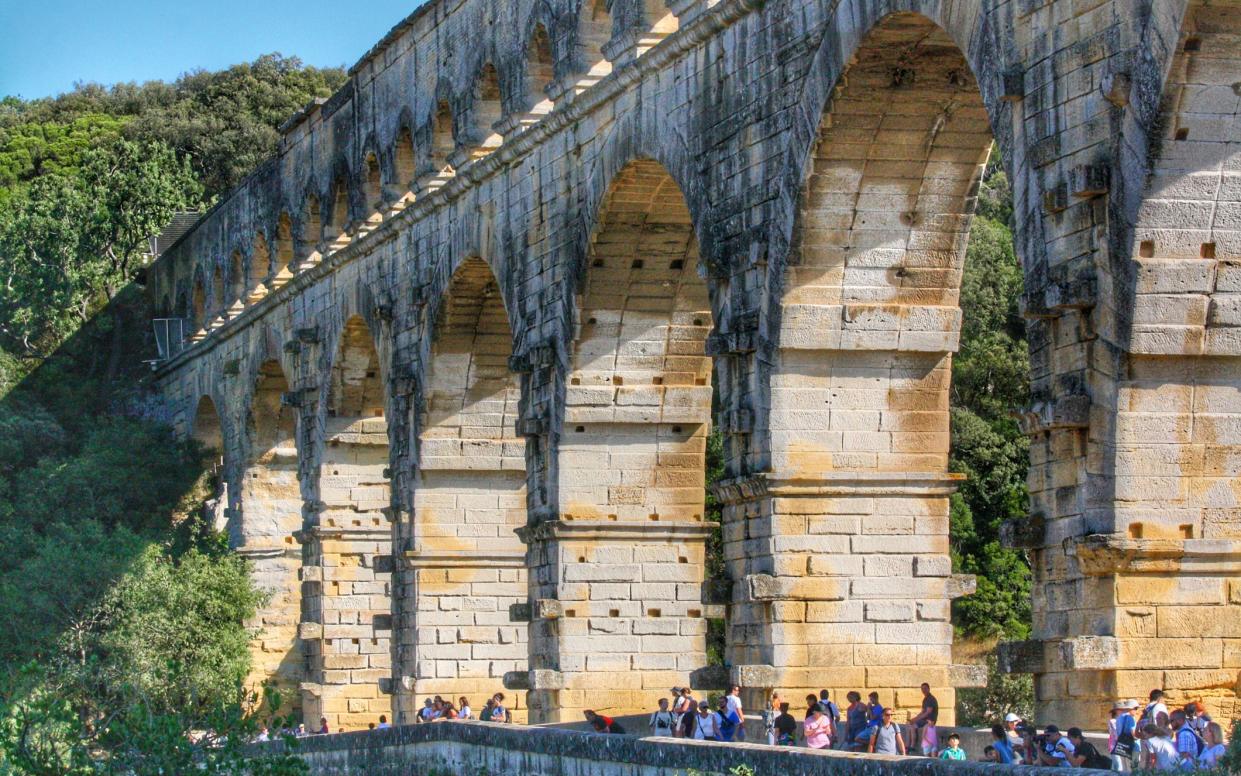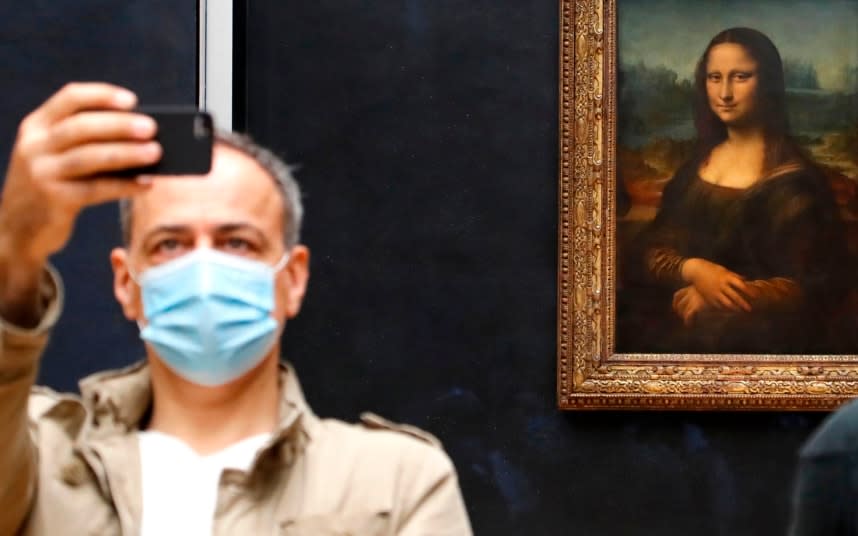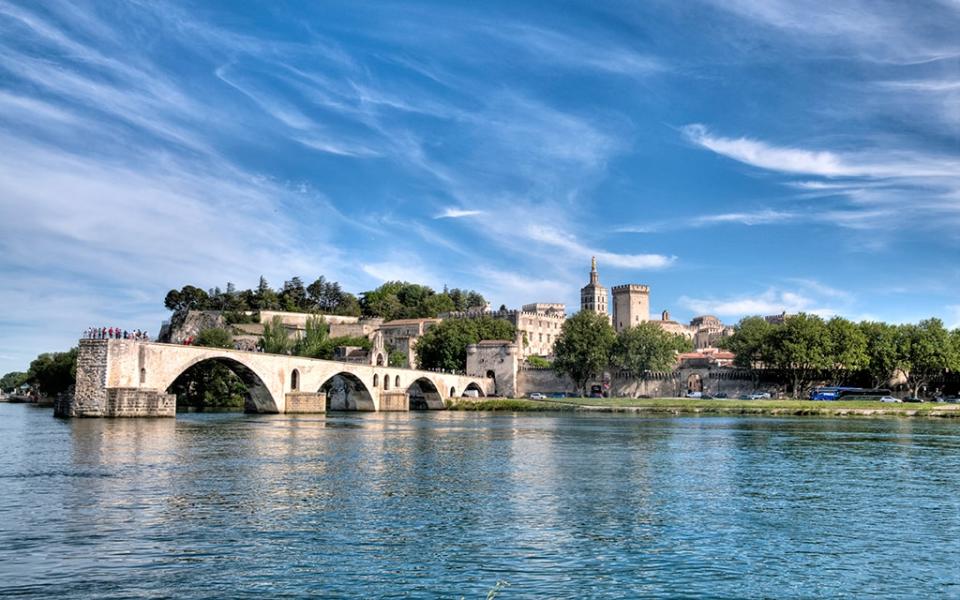Come to southern France, for a normal holiday amongst the fearless French

There are maybe three main worries causing potential travellers to be wary about venturing over the Channel right now. Firstly, are they likely to be in contact with disease? Secondly, and conversely, will precautions taken against the disease render a holiday artificial, like party-time in the ICU?
And thirdly, will they be welcome? I am in the happy position of being able to put minds at rest. In order: the French are at least as conscientious as any other Europeans in the matter of masks, social distancing and what-have-you. Out and about in southern France this week, I used so much gel that my hands were more gel than hands. There were distance markers on shop floors and arrows indicating which route to take to the counter even when taking any other route would have required step-ladders.
But – and here’s the thing – they’ve assimilated all these safeguards and got on with the job of living, and enjoying life, pretty normally. “It’s impressive how quickly things have returned to almost as they were before,” e-mailed Benoît Diéval from the Pas-de-Calais tourist board. Like the Louvre – which re-opened this week – pretty much everything in France is now up and running again, with the exception of night-clubs. (A blessèd relief, if you ask me. But no-one does.)
In Normandy, the Impressionist festival is back on track, in Avignon the Palais des Papes is open as, in Bordeaux, is the Cité du Vin. Many places, like the Louvre, require you book ahead online. They also restrict numbers to avoid crowds. That’s bad, money-losing news for the establishments but great for the public, who no longer have to thrust aside people waving selfie-sticks to see the Mona Lisa.
Thirdly, the French are dying to see us. I found absolutely no evidence justifying a recent YouGov poll suggesting that Europeans want British holidaymakers to stay away. Quite the reverse. As Anne Dallaporta of the Var Tourism Board said: “It goes without saying that we are looking forward to welcoming our British friends.” French women like Ms Dallaporta are typically polite and gracious – but there’s no doubting the genuineness of this sentiment. Of course they’re keen to see us. We’re vital to their holiday trade – not least at the top-end, where the absence of big-spending Americans is causing havoc. (The YouGov poll questioned 1,000 people in France – as in other countries. That meant that 62,272,511 French people weren’t questioned.)

So, no worries – and, incidentally, a boon for those people who spend their holidays trying to avoid other Britons or complaining when any other Britons show up. You know the sort. They say: “Great place, no other Brits.” Or “We had to leave, the place was overrun with Brits.” I think they’re crazy but they are also legion – and, for them, now is absolutely the right time to travel because, presently, hardly any other English-speakers are doing so. Crossing the central Place de l’Horloge in Avignon yesterday, I didn’t overhear a word of English when, there, I generally overhear nothing but.
Prior to that, I’d been on the Languedoc coast, stuck in a traffic jam at the entry to Le Grau du Roi. This was good. There are few more pertinent signs that seaside resorts are back to normal than a traffic jam. Locals had been dreaming of same during lockdown. Anyway, a traffic jam with flamingo-filled lagoons on both sides is no hardship. Once I’d got in, the place was humming with the hazy hubbub of holidaying folk loudly doing little. Le Grau du Roi is not only the least pronounceable of Languedoc resorts (try “le Grroh-du-Rwa”) but also the most solidly attractive. It retains the French Med’s second fishing port, fishing boats chugging along the main channel which splits the town in two. The quayside scrum of tackle, nets, ropes and tanned blokes with roll-ups unloading sea-bass gives on to open-fronted holiday shops (“Italian ices!” “Waffles!” “All shoes €10!”) and a zillion café terraces.

These, incidentally, include that of the Hotel Bellevue et d’Angleterre, where Ernest Hemingway stayed in 1927, and again in 1948, when preparing his gender-questioning novel Garden Of Eden. It’s set in Le Grau du Roi. I doubt the Bellevue et d’Angleterre terrace has changed immensely since Hemingway’s day. This week, it was flourishing. So were nearby cafés and restaurants – where a three-course lunch could easily be had for 15 quid. In normal times, Le Grau’s clientele is at least 80 per cent French and, as town PR woman, Stéphanie Aillet said, they’ve all come bouncing back post lockdown, through June and early July. “Many hotels are booked up, at least at weekends,” said Stéphanie.
Certainly they were an awful lot of people around the campsites and tiny pedestrian streets yesterday. The beaches too – but, with miles of in-town sand and six more miles of the untamed, dune-backed Espiguette beach just round the corner, social distancing was scarcely a problem. You’d have needed a loud-hailer to chat with the next family along. Le Grau du Roi is a regular destination for ordinary French holidaymakers, the sort who favour boules and pastis, and who illustrate that French people come in all shapes and sizes, not just smart and slim. This will nicely suit a certain British mind-set (ie, mine). The resort has few airs and graces, not even as the coast segues into Port Camargue, France’s biggest marina, where richer people gather.

Here, the marina-side Hotel Spinaker has been given a contemporary makeover in the past five years – all white, blue and grey with the coolest bars and restaurant imaginable and, in recent weeks, a terrific wheeze to still customer worries. This is a sort of robot emitting UV-C rays which, placed in a bedroom for 15-30 minutes after guests have left, apparently kills off 99 per cent of bacteria and germs before the next guests arrive. “Around £5,500 a piece, and we have three,” said hotel owner Veronika Thierry. It’s worked, mind. “We’re almost entirely booked up to the end of August,” she said. “But there’s always September – and we’re only 15 minutes from Montpellier airport. Perfect for people from London.” The Spinaker has, incidentally, maintained a breakfast buffet – but with an overseer. She will discourage you from taking, say, a banana, then changing your mind and putting it back, the scourge of buffets.
Apart from that, and try as I might, I couldn’t find anything around here which would significantly impede a normal holiday. (And I’m not convinced non-returnable bananas count as significant.) On top of all this, Oasis and David Bowie are playing the town’s arena on August 22, Led Zeppelin and ZZ Top the following night. The poster surprised me, too. The words “tribute festival” were written very small.
I left, out over the Camargue flatlands of white horses, black bulls and deep pink salt-pans, north to the Pont-du-Gard, the Roman aqueduct never surpassed in grandeur by any subsequent water-works. To August 30, a nightly son-et-lumière summer show is once again flattering one of France’s greatest historical sights. On six evenings – July 15, 22, 29, August 5, 12, 19 – the pont also hosts a beneath-the-stars festival of local wines, food truck food and live music. I went last year. It’s spellbinding (pontdugard.fr).
Up the Rhône valley, Avignon should, this month, have been at full stretch with the drama festival which generally transforms it into Edinburgh-on-Rhône. The city heaves with actors, musicians, comedians and anyone else associated with theatre-biz. Last time I was through in July, a cacophony of posters (“Godot est arrivé!”, “Romeo Hates Juliet”) flapped from ancient walls, railings and lamp-posts offering everything it is conceivable to offer on stage, slapstick through musicals, the “stupidest man on earth” and Anouilh, to Shakespeare and Flemish absurdists. Crowds milled. Through them wove a ceaseless stream of costumed performers drumming up custom for their shows, of which there were more than 1,100 every single festival day. Within minutes, I'd gathered my own weight in flyers. The buzz of purpose was palpable. There never was a more densely hopeful city.
This year: nothing. Or, at least, less – which might suit those unsuited to urban frenzy. In truth, throughout the old centre, there was, this week, a healthy flow of sunshine strollers, shoppers and folk making for the Palais des Papes. French visitors – there seemed to be no others, apart from me – appeared content to have to themselves the ancient capital of Christendom. It was most pleasantly calm, especially with the accompaniment of a rum and raisin ice-cream.

But this wasn’t helping fill the city coffers or flatter its reputation as a cultural centre. Thus, as with many other places in France hit by Covid cancellations, Avignon has devised compensatory attractions. As Valérie Gillet of the local tourist board said: “Constraints impose ingenuity.” The main honour courtyard of the Palais des Papes – usually hub of the official festival – will, all this month, screen recordings of the greatest productions staged there since 1948. Isabelle Huppert’s version of Euripides’ Medea, due on July 19, may be a highlight.
That said, Avignon hotels and restaurants have, like all of their breed, taken a serious hit. They’re not out of the woods yet – especially not, as mentioned earlier, at the top end. La Mirande is the most elegant hotel in town and, money-wise, well down, according to owner Martin Stein. “On the other hand, the break has been useful. In 30 years of running the hotel, we’ve never before had time to pause and reflect,” said Mr Stein – who resembles less the owner of a five-star hotel, more a professor of Renaissance poetry.
In the past, hotels like his have relied heavily on Americans, British and other English-speaking peoples. “Without them, we wouldn’t exist,” he said. Post-covid, to attract a more local clientele, he has converted the hotel’s vaulted medieval basement into a sort of canteen where one might dine on three-courses for 23 quid. This in a hotel which otherwise wears a Michelin star for cooking. I’ve not eaten there but it smells and looks terrific, somewhat similar to a series of small banqueting halls.
So there we are. If you’re tempted to come to France, I wouldn’t hesitate. If you’re not, if you’re the sort of Francophobe still waging the Napoleonic wars 200 years on, please don’t tell me about it. Simply have a lovely holiday somewhere else.


